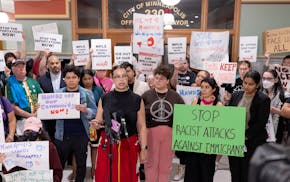Minneapolis' city auditor told officials Monday the city has widespread problems in the way it doles out contracts to private companies to do everything from clear homeless encampments to prevent violence.
Specifically, City Auditor Robert Timmerman highlighted concerns about a no-bid contract with Helix, a for-profit company hired to clear a large homeless encampment in 2023.
"It is abundantly clear that the contract oversight across different departments within the city is lacking," Timmerman told the city's Audit Committee Monday, speaking generally about the problem.
He compared it to the state failures that led to the massive $250 million Feeding Our Future fraud, when people took money meant to feed hungry children during the pandemic and used it to buy luxury houses, cars and property across the globe. Like the state, the city has failed to check to make sure contractors are doing the work they're hired to do, he said.
Timmerman said the city needs to train employees how to effectively oversee contracts.
"Nobody does site visits," Timmerman said. "If we go out on site and we see that this contractor is being paid a million dollars to do what they have agreed to do, and there's no activity happening, we need to address that early and not wait for audit to come look at it after the fact."
Timmerman said the city has had recurring issues with contracts "propped up" by the mayor and City Council members without the standard staff review by procurement personnel and attorneys. He said the situation is unsustainable and "very risky."
Over the past three months, auditors have looked at three Neighborhood Safety Department contracts with similar oversight problems, he said. When the city is getting $800 grocery store bills for Neighborhood Safety Department contracts, that might be legitimate, but sometimes there's no accompanying documentation, he said.
The city auditor said it's not illegal for a City Council member or the mayor to "expedite a contract" but it's "certainly not a best practice." The state legislative auditor has recommended state lawmakers stop the practice of direct grants by lawmakers, he noted, and he would also recommend the city limit them.
Timmerman said "there's been some movement within the administration in acknowledging shortfalls" and the City Attorney's Office has created training to help administrators oversee contracts.
Auditor: Homeless contract lacked oversight
One such contract that was quickly awarded by city leaders without competitive bidding was recently found to have duplicate payments and insufficient oversight.
The City Auditor's Office did a limited review — not a full-blown audit — of a nearly $1 million contract with a for-profit group called Helix Health and Housing Services to clear a large Indigenous homeless encampment in south Minneapolis dubbed Camp Nenookaasi in the fall of 2023.
The city hired Helix to do a pilot project aimed at moving 32 people into temporary housing and providing substance-abuse treatment and mental health services. The city had previously partnered with Hennepin County to do such work.
In the first two months, the encampment was repeatedly shut down — only to have residents set up another encampment nearby. But Helix reported it housed nearly 100 people, surpassing its goal. Of those 100, 42 remain "stably housed" Tuesday, and an additional 24 were attending drug treatment, according to Helix.
The original $466,000 budget more than doubled by the time the contract was signed, Community Safety Auditor Travis Kamm said. Of that, $104,500 was spent on housing, Kamm said. The rest went to staffing, operating and overhead.
The city auditor found Helix was overpaid $177,000, and was paid a $239,000 advance without clearly identifying expenses or laying out how the funds would be repaid. The city discourages such advances.
The overpayment was later reconciled through offsets of future payments.
City Council President Elliott Payne characterized the contract as the result of a handshake deal by Mayor Jacob Frey.
"It's my understanding that it was a bit of a handshake deal, with the mayor coming back to City Hall and saying, 'Make this happen,'" Payne said. "I think staff did their level best to really try to be responsive to the moment and I think that created the conditions for lots of errors just to have it moving quickly."
City spokeswoman Jess Olstad defended the contract. "This was at a time of urgent need, as cold weather was approaching, and we needed to provide compassionate care quickly," she said. "Helix — led and staffed by Native Americans — was uniquely positioned to deliver these services."
Frey and a unanimous City Council signed off on the contract, which was a "single/sole source contract," which city administrators are allowed to award without competitive bidding in certain cases. Kamm said the city should review conflicts of interest and establish clear guidelines for such contracts.
Audit Committee Member Lily Hosbein said the Helix contract "just feels a little icky, like it's not best practice."
Helix co-owner Adam Fairbanks said Tuesday that the city approached other groups that deal with homeless populations and none was willing to take on the task.
Brette Hjelle, deputy city operations officer, said changes have been made to improve contract tracking and training.
The Health Department deemed the contract a success for 94 homeless people. Health Commissioner Damōn Chaplin stood by that, saying it was an innovative approach to a "special problem" where people were moving in groups.
The residents were housed in groups with people they wanted to live with.

Minneapolis City Council lowers street food cart license fee, hoping fruit sellers will hawk legally

How the federal raid unified the fractious Minneapolis City Council against Trump, sort of
Trump travel ban 'cruel,' Minnesota advocacy group says

No verdict after first day of jury deliberation in Derrick Thompson murder trial for crash that killed 5

